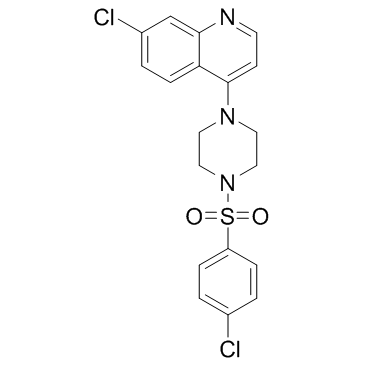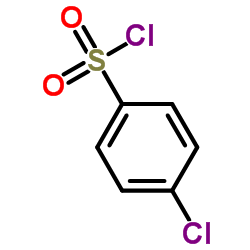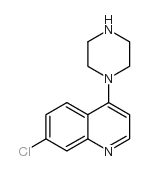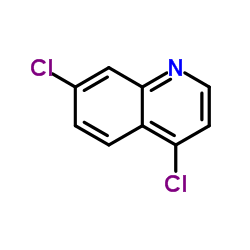KM 11060
Modify Date: 2025-08-25 09:46:18

KM 11060 structure
|
Common Name | KM 11060 | ||
|---|---|---|---|---|
| CAS Number | 774549-97-2 | Molecular Weight | 422.328 | |
| Density | 1.5±0.1 g/cm3 | Boiling Point | 607.3±65.0 °C at 760 mmHg | |
| Molecular Formula | C19H17Cl2N3O2S | Melting Point | N/A | |
| MSDS | Chinese USA | Flash Point | 321.1±34.3 °C | |
| Symbol |

GHS06 |
Signal Word | Danger | |
Use of KM 11060KM11060 is a novel corrector of the F508del-CFTR trafficking defect.Target: CFTRin vitro: Small-molecule correctors such as KM11060 may serve as useful pharmacological tools in studies of the F508del-CFTR processing defect and in the development of cystic fibrosis therapeutics. KM11060 rescues F508del-CFTR trafficking in cultured cells and native epithelial tissues. KM11060 partially corrects F508del-CFTR processing and increases surface expression to 75% of that observed in cells incubated at low temperature. Up to 50% of the F508del-CFTR in cells treated with KM11060 was complex-glycosylated, indicating passage through the Golgi. KM11060 as a promising compound for further development of CF therapeutics. [1]in vivo: In LPS-induced acute lung inflammation, blockade of PSGL-1 (P-selectin glycoprotein ligand-1) or P-selectin, antagonism of PAF by WEB2086, or correction of mutated CFTR trafficking by KM11060 could significantly increase plasma lipoxin A4 levels in F508del relevant to wildtype mice. [2] |
| Name | 7-chloro-4-[4-(4-chlorophenyl)sulfonylpiperazin-1-yl]quinoline |
|---|---|
| Synonym | More Synonyms |
| Description | KM11060 is a novel corrector of the F508del-CFTR trafficking defect.Target: CFTRin vitro: Small-molecule correctors such as KM11060 may serve as useful pharmacological tools in studies of the F508del-CFTR processing defect and in the development of cystic fibrosis therapeutics. KM11060 rescues F508del-CFTR trafficking in cultured cells and native epithelial tissues. KM11060 partially corrects F508del-CFTR processing and increases surface expression to 75% of that observed in cells incubated at low temperature. Up to 50% of the F508del-CFTR in cells treated with KM11060 was complex-glycosylated, indicating passage through the Golgi. KM11060 as a promising compound for further development of CF therapeutics. [1]in vivo: In LPS-induced acute lung inflammation, blockade of PSGL-1 (P-selectin glycoprotein ligand-1) or P-selectin, antagonism of PAF by WEB2086, or correction of mutated CFTR trafficking by KM11060 could significantly increase plasma lipoxin A4 levels in F508del relevant to wildtype mice. [2] |
|---|---|
| Related Catalog | |
| References |
| Density | 1.5±0.1 g/cm3 |
|---|---|
| Boiling Point | 607.3±65.0 °C at 760 mmHg |
| Molecular Formula | C19H17Cl2N3O2S |
| Molecular Weight | 422.328 |
| Flash Point | 321.1±34.3 °C |
| Exact Mass | 421.041840 |
| PSA | 61.89000 |
| LogP | 4.19 |
| Vapour Pressure | 0.0±1.7 mmHg at 25°C |
| Index of Refraction | 1.676 |
| InChIKey | GIEHIZKCIZLXLF-UHFFFAOYSA-N |
| SMILES | O=S(=O)(c1ccc(Cl)cc1)N1CCN(c2ccnc3cc(Cl)ccc23)CC1 |
| Storage condition | 2-8℃ |
| Symbol |

GHS06 |
|---|---|
| Signal Word | Danger |
| Hazard Statements | H301 |
| Precautionary Statements | P301 + P310 |
| Personal Protective Equipment | Eyeshields;Faceshields;Gloves;type P2 (EN 143) respirator cartridges |
| RIDADR | UN 2811 6.1 / PGIII |
| HS Code | 2935009090 |
| Precursor 3 | |
|---|---|
| DownStream 0 | |
| HS Code | 2935009090 |
|---|---|
| Summary | 2935009090 other sulphonamides VAT:17.0% Tax rebate rate:9.0% Supervision conditions:none MFN tariff:6.5% General tariff:35.0% |
|
Important role of platelets in modulating endotoxin-induced lung inflammation in CFTR-deficient mice.
PLoS ONE 8 , e82683, (2013) Mutation of CFTR (cystic fibrosis transmembrane conductance regulator) leads to cystic fibrosis (CF). Patients with CF develop abnormalities of blood platelets and recurrent lung inflammation. However... |
| 7-Chloro-4-{4-[(4-chlorophenyl)sulfonyl]-1-piperazinyl}quinoline |
| Quinoline, 7-chloro-4-[4-[(4-chlorophenyl)sulfonyl]-1-piperazinyl]- |
| 7-chloro-4-{4-[(4-chlorophenyl)sulfonyl]piperazin-1-yl}quinoline |
| 7-chloro-4-{4-[(4-chlorophenyl)sulfonyl]piperazino}quinoline |
| KM 11060 |
| KM11060 |




